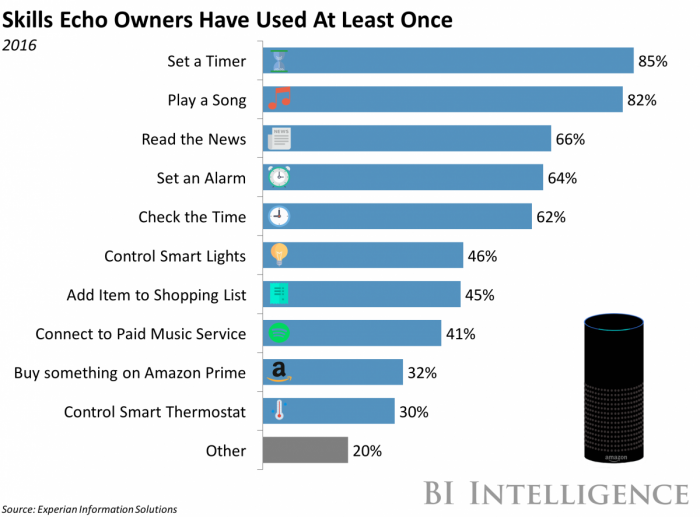Amazon announces two co-projects with Intel to expand Alexa's use

(BI Intelligence)
This story was delivered to BI Intelligence IoT Briefing subscribers. To learn more and subscribe, please click here.
At its AWS re:Invent conference, Amazon announced a pair of joint initiatives with Intel centered on offering developers the tools to build Alexa-powered devices, according to Engadget.
As Alexa's capabilities continue to expand, the AI-powered voice assistant is becoming a major monetization asset for Amazon, and this latest news means that Alexa could expand beyond its traditional commercial profile. Here's more on the initiatives:
Intel developed a reference design for a smart speaker product that uses Alexa voice controls. This is meant to incentivize companies to manufacture their own devices using Alexa's AI voice capabilities and Intel's hardware platform. The design will be made available to other companies starting early in 2017.
Intel expanded Alexa voice controls to its Smart Home Hub. This essentially means that the company is helping developers build smart home devices that can be controlled through voice commands.
For Intel, this continues the company's expansion into the smart home and the IoT more broadly, as it seeks to mitigate the slowing of its traditional PC business. The chipmaker earlier this year formed a partnership with Microsoft and Samsung to help those companies' smart home devices work together as seamlessly as possible. Additionally, the microprocessor company unveiled a series of new chips for the IoT that could have uses within the smart home. It also continues to see steady growth in its overall IoT business, which its smart home business is a part of.
But for Amazon, this means that it could be expanding Alexa's opportunities to earn revenue for the company. Thus far, Prime voice ordering has been the only major source of revenue from the Alexa voice assistant. But Amazon could be seeking to expand the footprint of the assistant in order to enhance its ability to generate revenue.
In the future, Amazon could seek to further monetize Alexa by licensing its capabilities to hardware manufacturers and designers, following the model of this agreement with Intel. Overall, it's Alexa's position as a facilitator of further transactions within the Amazon ecosystem that primarily makes the voice assistant a strong platform for monetization.
It remains to be seen if this project will help the U.S. smart home market truly take off. At its current state, we believe the smart home market is stuck in the 'chasm' of the technology adoption curve, in which it is struggling to surpass the early-adopter phase and move to the mass-market phase of adoption.
There are many barriers preventing mass-market smart home adoption: high device prices, limited consumer demand and long device replacement cycles. However, the largest barrier is the technological fragmentation of the smart home ecosystem, in which consumers need multiple networking devices, apps and more to build and run their smart home.
BI Intelligence, Business Insider's premium research service, has compiled a detailed report on the U.S. smart home market that analyzes current consumer demand for the smart home and barriers to widespread adoption. It also analyzes and determines areas of growth and ways to overcome barriers.
Here are some key takeaways from the report:
Smart home devices are becoming more prevalent throughout the US. We define a smart home device as any stand-alone object found in the home that is connected to the internet, can be either monitored or controlled from a remote location, and has a noncomputing primary function. Multiple smart home devices within a single home form the basis of a smart home ecosystem.
Currently, the US smart home market as a whole is in the "chasm" of the tech adoption curve. The chasm is the crucial stage between the early-adopter phase and the mass-market phase, in which manufacturers need to prove a need for their devices.
High prices, coupled with limited consumer demand and long device replacement cycles, are three of the four top barriers preventing the smart home market from moving from the early-adopter stage to the mass-market stage. For example, mass-market consumers will likely wait until their device is broken to replace it. Then they will compare a nonconnected and connected product to see if the benefits make up for the price differential.
The largest barrier is technological fragmentation within the connected home ecosystem. Currently, there are many networks, standards, and devices being used to connect the smart home, creating interoperability problems and making it confusing for the consumer to set up and control multiple devices. Until interoperability is solved, consumers will have difficulty choosing smart home devices and systems.
"Closed ecosystems" are the short-term solution to technological fragmentation. Closed ecosystems are composed of devices that are compatible with each other and which can be controlled through a single point.
In full, the report:
Analyzes the demand of US consumers, based off of survey results
Forecasts out smart home device growth until 2020
Determines the current leaders in the market
Explains how the connected home ecosystem works
Examines how Apple and Google will play a major role in the development of the smart home
Some of the companies mentioned in this report include Apple, Google, Nest, August, ADT, Comcast, AT&T, Time Warner Cable, Lowe's, and Honeywell.
To get your copy of this invaluable guide, choose one of these options:
Subscribe to an ALL-ACCESS Membership with BI Intelligence and gain immediate access to this report AND over 100 other expertly researched deep-dive reports, subscriptions to all of our daily newsletters, and much more. >> START A MEMBERSHIP
Purchase the report and download it immediately from our research store. >> BUY THE REPORT
The choice is yours. But however you decide to acquire this report, you’ve given yourself a powerful advantage in your understanding of the smart home market.
More From Business Insider

